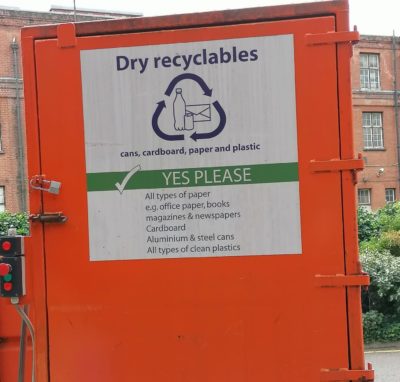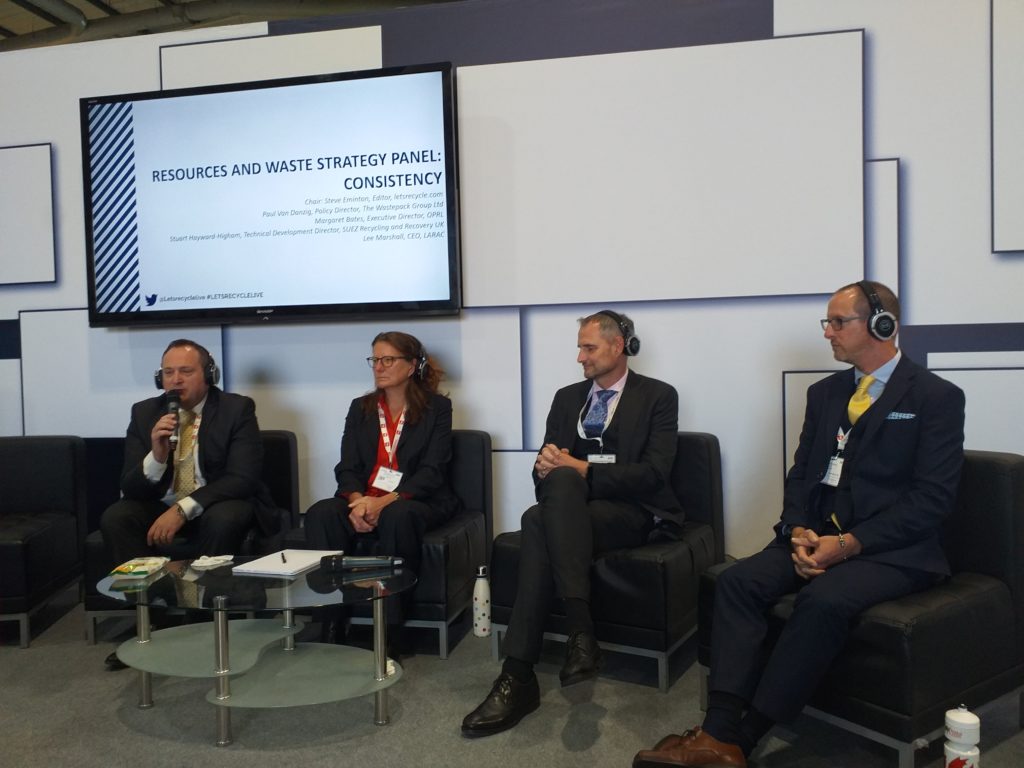A panel discussion on the strategy took place on the second day of the Letsrecycle Live trade show at Stoneleigh Park near Coventry on 16 September.
Chaired by letsrecycle.com’s editor Steve Eminton, the panel consisted of Paul Van Danzig, policy director at the Wastepack Group, Margaret Bates, executive director of the On-Pack Recycling Label Ltd (OPRL), Stuart Hayward-Higham, technical development director at Suez, and Lee Marshall, CEO of the Local Authority Recycling Advisory Committee (LARAC).
Referring to policies under extended producer responsibility (EPR) whereby fees will be ‘modulated’, Professor Bates said: “Rewarding people for doing the right thing is the way we should go.”
Modulated fees will see the amount paid by the producer vary according to criteria relating to their products’ environmental performance.
Professor Bates also said that she “liked” that EPR would see local authorities receive the full net costs of the waste services covered by producers but expressed concerns that without clearer guidance this could only prove to be “temporary”.
She said there were 680 OPRL members, each of whom was still “not clear” which label they would have to use on their packaging going forwards.
Each panellist also agreed that Defra should pause its plans for the introduction of a deposit return scheme (DRS) until EPR and the proposed consistency measures were “up and running”.
‘Massive evolution’
Similar sentiments were expressed by Mr Hayward-Higham, who said he was “pleased” with Defra’s initial engagement with the sector but was “less keen” on the government department’s approach since the launch of the second round of consultations on the strategy.
Let’s all dig deep in the next nine months, otherwise we’ll get things wrong
– Stuart Hayward-Higham, technical development director at Suez
Mr Hayward-Higham said the proposals, which include EPR, DRS, and consistency in recycling, represented a “massive evolution”.
He said he was keen to see the introduction of modulated fees, which would drive change in “evidence and design”.
He said the proposed timelines for the policies, some of which will be introduced as early as 2023, were “feasible” if everybody worked together for the next nine months. He described the changes as effectively “two budgets away”.
However, Mr Hayward-Higham questioned from where local authorities would receive their funding to set up the required infrastructure if money did not “flow” until 2023.
“This solution isn’t deliverable by government on its own. We’ve all got to be ambitious not to let the timelines drift,” Mr Hayward-Higham said. “Let’s all dig deep in the next nine months, otherwise we’ll get things wrong.”
Business waste
Mr Van Danzig disagreed, suggesting the introduction of the policies was not feasible in the proposed timescales, given they were “challenging and technical”. “We don’t even really know what the changes are yet,” he said.

Mr Van Danzig said the Resources and Waste Strategy represented a “good opportunity” to address the “issues” which had arisen since the inception of the PRN system. “It’s good government is listening to us.”
However, he expressed concerns that some of the proposals, especially those concerning competition and business waste were potentially “unlawful, unworkable or not joined up”.
He asked: “How far down the line are we going to get before someone tells us this can’t be done?”
Under EPR, the costs of dealing with the nation’s packaging waste could be “north of £2.7 billion”, he said. He claimed that, under the PRN system, 2019 saw the highest ever costs, at £375 million. “The difference in costs is staggering,” he said.
Food waste
Mr Marshall said he was pleased the strategy would include the roll-out of free food waste collections across the country.

However, he said he was worried that during the first consultations it had been suggested the roll-out could take place over a period of seven years, whereas during the more recent consultations there was a “hard-stop deadline” of 2023.
“We can go quicker if you put the funding in, but I don’t know if that represents value,” he said.
There has been a 40-50% reduction in government grants for local authorities in the last 10 years as a result of the financial crash, Mr Marshall said. He questioned whether the economic impact of Covid-19 would also see a reduction in funding or a withdrawal of promises.
Mr Marshall also questioned the wisdom of free garden waste collections, suggesting it was an unnecessary additional proposal.
He said he was more pleased with the proposal that producers would cover local authorities’ full net costs and the suggestion that there could be a “digital solution” for the DRS.












Subscribe for free